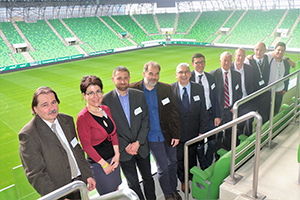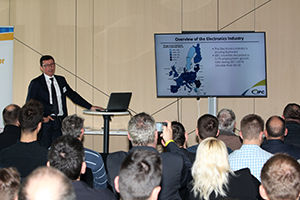By Chris Mitchell, vice president, global government relations
Key Summary
• The TCJA reshaped the U.S. tax code to promote competitiveness and support electronics industry growth.
• Key provisions include a lower corporate tax rate, full expensing for investments, and preservation of the R&D tax credit.
• Several TCJA provisions will phase out or shift starting in 2022 and 2023, creating uncertainty.
• Pending regulations and unresolved tax extenders leave key details incomplete for manufacturers.
• IPC highlights long-term planning needs as major TCJA benefits expire without congressional action.
Monday, April 15 was the deadline for millions of Americans to file their income tax returns, so this is a good time to review the Tax Cuts and Jobs Act of 2017 (TCJA) as well as the current tax policy landscape and how these rules are affecting the electronics industry. TCJA Fostering Economic Growth In passing the TCJA, Congress restructured the U.S. tax code for the first time since 1986. IPC applauded the bill’s passage because of the need to replace an outdated tax code with one that promoted competitiveness and innovation in our industry and economy-wide. Several provisions were especially important to the electronics industry, including: • Lowering the corporate tax rate from 35 percent to 21 percent; • Allowing full and immediate expensing of capital investments placed in service between September 27, 2017 and January 1, 2023; and • Safeguarding the R&D tax credit. • The bill also allows many small businesses that are organized as “pass through” companies to claim a 20 percent deduction for the non-wage portion of pass-through income.
These provisions have helped generate stronger-than-expected GDP growth and near record-low unemployment. In fact, the number of U.S. job vacancies has exceeded the number of unemployed Americans for months. Most economists are forecasting continued growth through 2019. Changes Coming in a Few Years Even as we celebrate the success of the TCJA, we should be mindful of work yet to do and new issues that have come up. Here are a few that affect our industry:
• Bonus Depreciation Starts Ramping Down in 2023. The TCJA provided for 100 percent bonus depreciation for capital expenditures, spurring investments in plant and equipment. However, the law phases out bonus depreciation from 2023 to 2026. Bonus depreciation enjoys wide support on Capitol Hill, so there will be attempts to prevent its expiration. Some skeptics believe bonus depreciation is more appropriate as a tool for reversing economic downturns, while others say it is accelerating automation and jeopardizing jobs. We expect a tough fight to extend this provision past 2023.
• R&D Tax Credit Falls Short. Beginning in 2022, companies will be required to amortize R&D expenses over five years instead of claiming an immediate, full deduction as they do today. There are concerns that this will reduce R&D investment, and some in Congress are working to rewrite this provision. Moreover, a cadre of Congress members will continue to fight to increase the alternative simplified R&D credit from 14 percent to 20 percent to bring it in line with international competitors. But such an increase is considered unlikely.
• TCJA Regulations Still Pending. Significant portions of the tax law require the Treasury Department to issue implementing regulations, but many such rules are still in the proposal stage. Regulations can undergo significant changes as they go through the process, so IPC and its members will need to keep an eye on them and be prepared for further advocacy.
• Pass-throughs (S-Corps) Still Face Unfair Treatment and Significant Uncertainty. Pass-throughs have long argued for tax parity with C-Corps, and the authors of the TCJA sought to provide some relief by granting a 20 percent deduction on some pass-through income. However, legislative rules prevented Congress from making the relief permanent, and the deduction will vanish at the end of 2025. Because pass-through tax rates are tied to individual rates, any debate over changing them will get caught up in the political battle over marginal tax rates for individuals.
• Expiring Tax Provisions in Limbo. No sooner had the TCJA passed in 2017 than congressional efforts began to pass an “extenders packages” to reinstitute several old tax provisions that were left out of the bill. Currently, there are 29 so-called extenders that expired in 2017 and 2018, and we are beginning to see bipartisan interest in passing an extensions bill later this year. The two provisions with the most support are the biodiesel tax credit and the short-line rail maintenance credit. We will continue to monitor developments. • TCJA Exacerbates Budget Woes. The TCJA may be boosting economic growth, but it is not paying for itself. Tax revenues are falling below forecast, and the Trump administration’s FY2020 budget proposes $1 trillion+ annual deficits through FY2022. And that is a best-case scenario! Planning Ahead The TCJA made some very helpful changes to an outdated tax system. However, the tax writers also created a great deal of uncertainty by putting a time limit on some of the most significant and popular provisions, which are likely to expire in a few years absent a resurgence of bipartisanship. We know that many IPC members make long-term business decisions based on the tax code. Thus, your company may want to consider taking advantage of TCJA tax provisions while they last and working with IPC to advocate for smarter, more predictable tax policies in the future.





